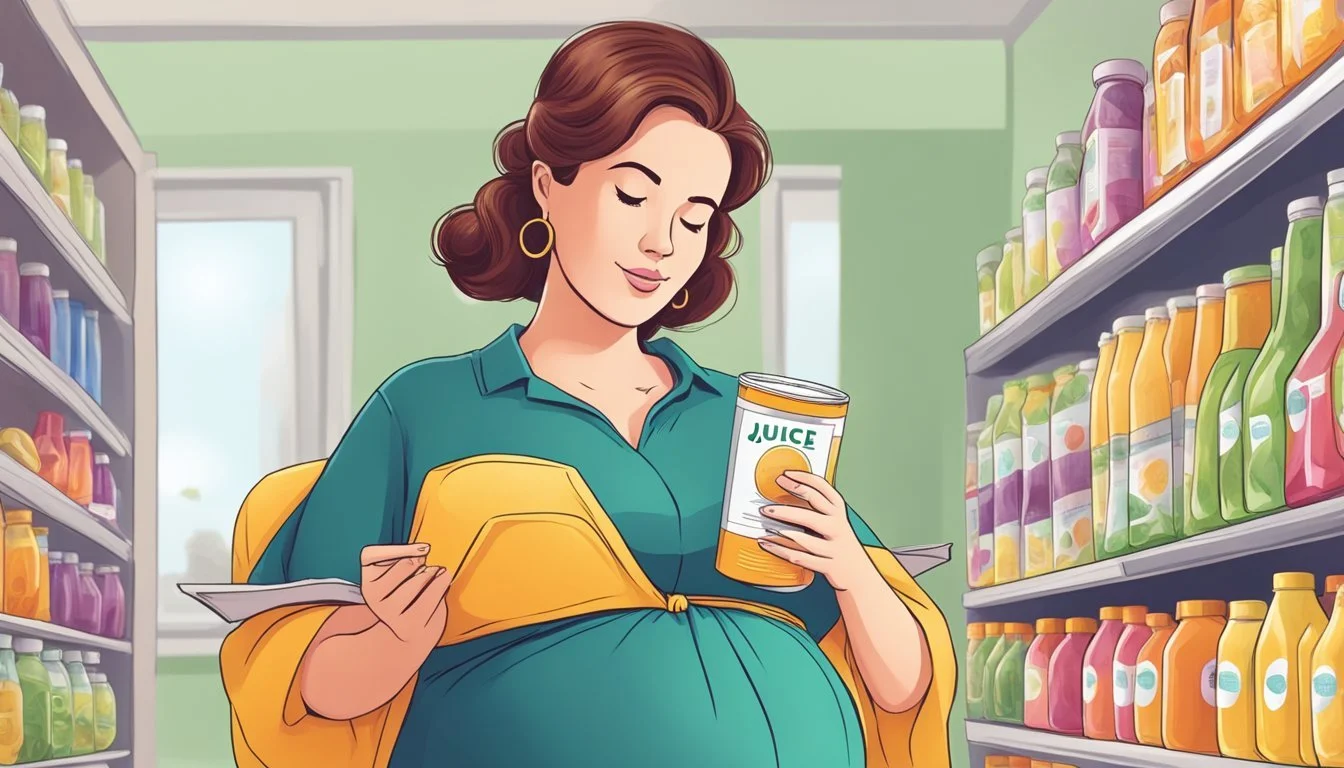Can Pregnant Women Drink Unpasteurized Juices?
Understanding the Risks
Pregnant women often face dietary restrictions to ensure the health and well-being of both mother and child. Among these restrictions is the consumption of unpasteurized juices, which is an important consideration for pregnant women. These raw juices may contain harmful bacteria from the fruits and vegetables used in their preparation. Such bacteria, including salmonella, E. coli, and others can lead to foodborne illnesses like listeriosis and toxoplasmosis, which are particularly dangerous during pregnancy because of the increased vulnerability of the immune system and the potential risks to the fetus.
While unpasteurized juices can be appealing for their freshness and perceived nutritional value, the risks they pose during pregnancy outweigh the benefits. These juices, found at farmers' markets, in some natural food stores, or made at home, have not undergone the pasteurization process that kills bacteria and other pathogens. Consequently, health organizations strongly advise pregnant women to avoid unpasteurized juices to protect against infection.
Instead, it is recommended that pregnant women choose pasteurized juices and dairy products. Pasteurization involves heating the juice to a temperature that kills most of the harmful bacteria without notably changing the nutritional content of the juice. This makes pasteurized juice a significantly safer choice for hydration and nutrition during pregnancy.
Understanding Pasteurization
When considering juice consumption during pregnancy, the pasteurization process is crucial as it directly affects the safety of the beverage.
Basics of Pasteurization
Pasteurization is a process that involves heating liquids such as fruit and vegetable juices to a specific temperature for a predetermined period. This is done to kill pathogens without significantly impacting the taste and nutritional value. Generally, the liquid is heated to at least 145°F (63°C) and maintained at that temperature for a certain amount of time, effectively eliminating most bacteria, viruses, and parasites that could cause harm.
Pasteurization vs. Raw Juices
Raw or unpasteurized juices are those that have not undergone pasteurization. They might contain pathogens like E. coli, Salmonella, and Listeria that could lead to foodborne illnesses. Such pathogens are particularly concerning for pregnant women due to the increased risk of complications. On the other hand, pasteurized juices have been heat-treated, reducing the potential for disease-causing microbes to be present.
Benefits of Drinking Pasteurized Juices
Drinking pasteurized juices during pregnancy is generally considered safe because pasteurization minimizes the risk of foodborne illnesses. The process does not significantly alter the nutritional content of the juice but does provide peace of mind by reducing the potential exposure to harmful bacteria found in water and soil that can contaminate fruits and vegetables.
Risks Associated with Unpasteurized Juices
Drinking unpasteurized juices during pregnancy poses significant health risks due to the potential presence of harmful bacteria that can lead to serious foodborne illnesses.
Potential for Bacterial Contamination
Unpasteurized juice is prone to bacterial contamination because it has not undergone pasteurization, a process that destroys pathogens by heating the juice to a certain temperature for a specific period. In the absence of this safety step, bacteria can thrive, especially when the juice is stored improperly or for too long.
Common Pathogens in Unpasteurized Juices
The most common harmful bacteria found in unpasteurized juices include Salmonella, E. coli, and Listeria monocytogenes. These pathogens can contaminate fruit and vegetables at any point during handling, from the farm to the final juice product.
Salmonella: Often associated with poultry and eggs, it can also be present in unpasteurized juices.
E. coli: Typically found in the intestines of animals and humans, certain strains can cause severe illness.
Listeria monocytogenes: Can be particularly dangerous for pregnant women, leading to conditions such as listeriosis.
Health Risks During Pregnancy
For a pregnant woman, ingestion of unpasteurized juices harboring dangerous bacteria can lead not only to food poisoning for herself but also to potential complications for her unborn child. The risks include miscarriage, premature labor, neonatal infection, or even stillbirth. Food safety practices during pregnancy are thus crucial to minimize the risk of infection and ensure the health of both mother and child.
Nutritional Considerations for Pregnant Women
During pregnancy, the nutritional content of what a woman consumes is of utmost importance. Juices can be a source of essential vitamins and minerals, but the method of preparation and its place within the overall diet need careful consideration.
Essential Nutrients in Juices
Juices, especially those made from fresh fruits, are rich in vitamin C, antioxidants, and other vitamins. Citrus fruits, like oranges, are known for their high vitamin C content, essential for the proper development of the baby's bones and teeth. However, many juices lack calcium and iron, which are crucial during pregnancy for bone health and preventing anemia, respectively. Expectant mothers should ensure these nutrients are present in their diet through other sources.
Impact of Juicing on Nutrient Content
The process of juicing can sometimes reduce the fiber content of fruits as the flesh and pulp are typically discarded. Fiber plays a vital role in maintaining a healthy digestive system and can help prevent gestational diabetes by stabilizing blood sugar. Additionally, certain vitamins might be lost during juicing. It's essential for pregnant women to ensure their juices retain the maximum nutrient content.
Balancing Juice Consumption with a Healthy Diet
While juices provide vitamins and minerals, they should not replace whole fruits in a diet. Pregnant women need a variety of nutrients that single juice servings cannot offer. Whole fruits include dietary fiber, which is usually absent in juice. Also, juices may have a higher calorie content which can contribute to excess weight gain if not balanced with other dietary components. Protein is another nutrient that is typically not present in juice but is necessary for the growth of the fetus, so pregnant women should incorporate protein-rich foods into their diet along with juice.
Safe Juice Consumption Practices
Pregnant women need to exercise caution when consuming fresh juices, as improper handling and preparation can lead to foodborne illnesses. The following guidelines aim to reduce these risks by outlining safe practices for homemade and commercial juices.
Guidelines for Homemade Juices
When preparing fresh-squeezed juice at home, it is imperative to thoroughly wash all fruits and vegetables under running water before juicing. Use a vegetable brush to scrub the surfaces and remove any debris. If making cold-pressed juices, ensure all equipment is cleaned adequately with soap and hot water to maintain food safety.
Choosing Safe Commercial Juices
Opt for store-bought juices that carry a label indicating they are pasteurized or treated with other safety processes. Pressed juices from the grocery store might also display a warning label if they have not been pasteurized. When at a farmers market, ask vendors about their safety standards and handling practices.
Buy: Pasteurized or treated commercial juices
Avoid: Juices without pasteurization or safety labeling
Ask: Vendors about their juice safety practices
Cleaning and Preparing Fruits and Vegetables
Before juicing, fruits and vegetables should be cleaned thoroughly. This includes:
Removing any damaged or bruised areas where harmful bacteria can reside.
Washing under running water rather than soaking.
Using clean cutting boards and utensils to avoid cross-contamination.
Always consult a healthcare provider for personalized advice, especially during pregnancy, and adhere to food safety practices as recommended by the Food and Drug Administration (FDA) for the best health outcomes.
Alternatives to Unpasteurized Juices
Pregnant women seeking safe hydration and nutrition have several alternatives to unpasteurized juices. These options can cater to the requirement for essential nutrients without the health risks associated with harmful bacteria.
Safe Beverage Options During Pregnancy
Pasteurized Juice: Pasteurized juices are heated to a temperature that kills bacteria, making them a safe choice. Pregnant women can enjoy a variety of fruit and vegetable juices that have been pasteurized without worry.
Water: Essential for hydration, water is the safest and most recommended drink. Pregnant women should aim for at least eight cups per day to prevent dehydration, which can lead to fatigue.
Milk: A great source of calcium, pasteurized milk supports the development of a baby’s bones and teeth. Pregnant women can also choose from various fortified plant-based milks for additional nutrients.
Ginger Tea: Known for its ability to alleviate morning sickness, ginger tea can be soothing. However, moderation is key, as excessive ginger may lead to complications.
It is advisable to limit consumption of sodas due to their high sugar content and lack of nutritional value.
Making Nutritious Smoothies
Smoothies: Homemade smoothies offer a nutritious alternative. They can be made with a mix of fresh or frozen fruits, vegetables, and a liquid base such as water, milk, or a dairy-free alternative.
Key Ingredients:
Fruit (fresh or frozen): To ensure natural sweetness and vitamins.
Vegetables (fresh or frozen): For fiber and essential minerals.
Base (liquid): Water, milk, or fortified plant-based beverages.
Add-ins: A spoonful of nut butter or a sprinkle of seeds can add healthy fats and proteins.
Smoothies provide an excellent way for pregnant women to consume essential nutrients and stay hydrated, making them a fantastic choice during pregnancy.
Special Considerations for Juice Consumption in Pregnancy
When considering juice consumption during pregnancy, women must take into account how it could interact with common pregnancy symptoms, adhere to dietary restrictions to ensure fetal health, and recognize when special diets may be necessary. These considerations are crucial in managing health and avoiding complications.
Dealing with Common Pregnancy Symptoms
Pregnant women often experience morning sickness and constipation, symptoms that can influence dietary choices. While some juices may help hydrate and provide vitamins, certain unpasteurized juices might increase discomfort or pose health risks. For instance, juices with a high sugar content can exacerbate nausea, whereas those high in fiber might alleviate constipation. However, drinking unpasteurized juice could introduce harmful pathogens, making it imperative to ensure juices are pasteurized to avoid additional health concerns.
Morning Sickness: Choose pasteurized or boiled juice to reduce risk.
Constipation: Opt for fiber-rich, pasteurized juices to facilitate digestion.
Understanding Pregnancy-Related Dietary Restrictions
A pregnant woman's immune system is often more susceptible to infection, making dietary restrictions critical to prevent foodborne illnesses. Healthcare providers advocate for avoidance of unpasteurized juices because they can contain bacteria like Listeria and Salmonella, which are especially dangerous during pregnancy due to potential complications. It's recommended to only consume pasteurized juices or those brought to a rolling boil for at least a minute to eradicate harmful organisms.
Juice Type Consideration During Pregnancy Unpasteurized Juice Avoid due to a high risk of bacterial contamination. Pasteurized Juice Safe to consume and preferred option. Home-squeezed Juice Consume only after proper heating to kill bacteria.
Assessing the Need for Special Diets
In specific circumstances, a healthcare provider may recommend special diets to support the growth and development of the fetus or address the pregnant woman's health conditions. Practices like juice cleanses or detox diets are generally not advised during pregnancy, as they may not provide all the necessary nutrients and could compromise both the mother's and fetus's health. Pregnant women should always consult healthcare providers before making any significant changes to their diet to ensure any chosen regimen supports their immune system and the baby's needs.
Frequently Asked Questions
This section addresses critical safety information on consuming unpasteurized juices during pregnancy and outlines advice from healthcare providers to ensure the well-being of both mother and child.
Answers to Common Concerns
Is it safe for a pregnant woman to drink unpasteurized juices?
No, it is not safe. Unpasteurized juices may contain harmful bacteria such as E. coli and Salmonella, which pose significant health risks to pregnant women and their unborn children.Can consuming raw vegetable juices affect pregnancy?
Drinking raw vegetable juices like kale, cucumber, or carrot that are unpasteurized can lead to infections because of the potential presence of bacteria which the immune system during pregnancy may not effectively combat.Are there certain types of juices that are safer during pregnancy?
Pasteurized citrus and other fruit juices are generally considered safe because pasteurization kills harmful bacteria. Pregnant women should ensure any juice they consume is labeled as pasteurized.
Advice from Healthcare Providers
What do healthcare providers recommend regarding juicing during pregnancy?
Healthcare professionals strongly advise pregnant women to consume only pasteurized juices and to avoid those that are unpasteurized to minimize the risk of foodborne illnesses.Should children consume unpasteurized juices?
Healthcare providers typically caution against giving children unpasteurized juices due to their susceptibility to the same bacterial infections that can affect pregnant women.
Healthcare providers can offer personalized guidance and answer further questions pregnant women may have about safe dietary choices, including the consumption of various types of juices.
Conclusion
Pregnant women are advised to avoid unpasteurized juices during pregnancy. Unpasteurized juices may contain harmful bacteria, such as Salmonella, E. coli, and Listeria, which carry a risk of food-borne illnesses. These infections can lead to severe complications for both the mother and the unborn child.
During pregnancy, the immune system is often compromised, making it challenging to fight off infections. The consequences of consuming contaminated unpasteurized juices can be significant. Listeriosis and toxoplasmosis, for example, are two potential conditions that can lead to premature delivery, miscarriage, or even stillbirth.
It is essential that a pregnant woman consult with her healthcare provider for guidance on safe dietary choices. Healthcare professionals usually recommend that pregnant women consume only pasteurized juices and other pasteurized dairy products to ensure safety for both the mother and the developing fetus.
For the health and well-being of both mother and baby, adhering to these dietary precautions is crucial:
Consume only pasteurized juices.
Avoid fresh-squeezed juices unless they have been pasteurized or made at home following strict hygienic practices.
Monitor for any signs of illness if accidental consumption occurs and seek immediate medical attention.
Expectant mothers should prioritize the safety of their dietary intake by avoiding unpasteurized products and adhering to food safety practices recommended by healthcare providers.









